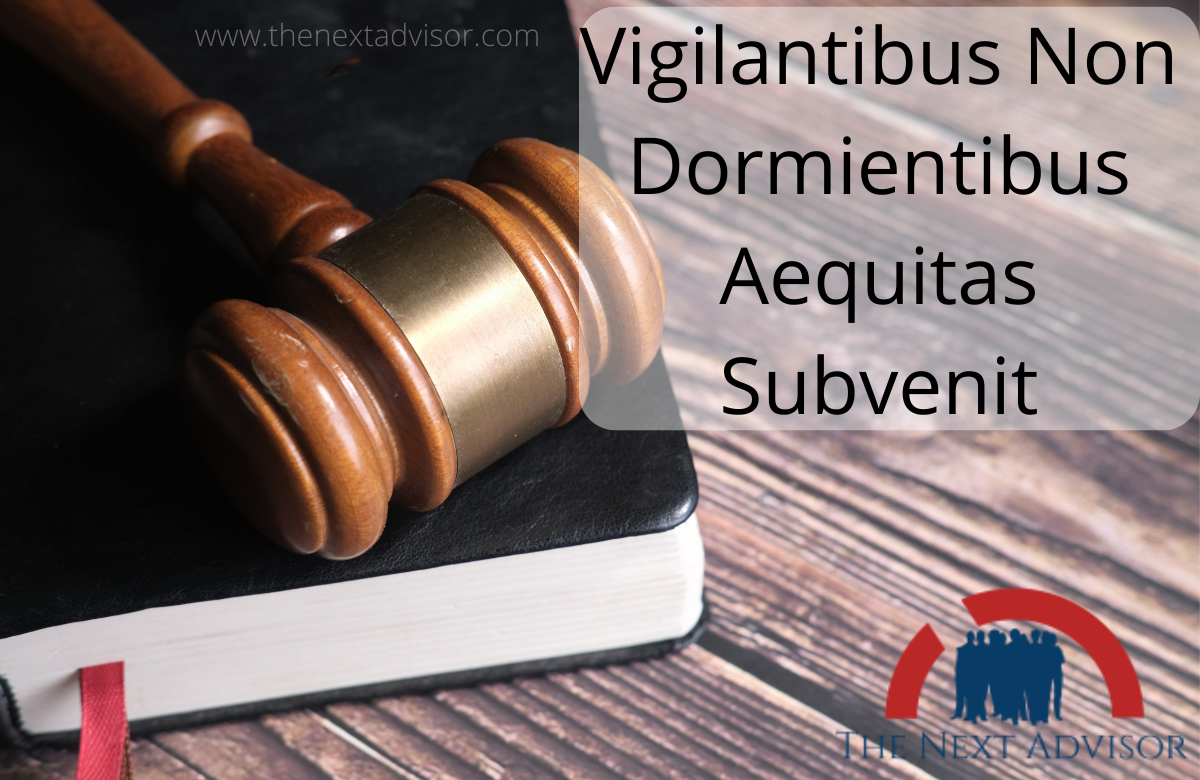Vigilantibus Non Dormientibus Aequitas Subvenit is the Latin Maxim. Vigilantibus Non-Dormientibus Aequitas Subvenit gives the meaning of What happens if you sleep on your rights?
Can you imagine a situation? where you are walking on the road and this is casual walking. A bike passes by you and literally robbed your money purse. You did not take on action on that day. You just go home and you just do not talk about it to anyone. Many years passed, and one day suddenly after many years you think it is a perfect time to file a case against that particular person after many years have passed.
Do you think you can still file a case? Vigilantibus Non-Dormientibus Aequitas Subvenit, this particular Maxim says that the law only assists those who are vigilant and not who sleep over their rights. So there are high chances that nobody will be able to help now.
Vigilantibus Non Dormientibus Aequitas Subvenit Maxim has verious branches of law.
Law can help an individual if they are vigilant but not to those who were sleeping over their right.
– There the legal right which is violated should be presented before the Court of law within a prescribed time period.
Vigilantibus Non Dormientibus Aequitas Subvenit Maxim speaks about the limitation Act.
– The limitation act exists to provide limitations.
– Hence it’s very important to file a suit within that limited amount of time.
CrPc Sections related with Vigilantibus Non Dormientibus Aequitas Subvenit
Section 468 of CrPC. Bar to taking cognizance after lapse of the period of limitation.
( 1 ) Except as otherwise provided elsewhere in this Code, no Court shall take cognizance of an offence of the category specified in sub-section ( 2 ), after the expiry of the period of limitation.
( 2 ) The period of limitation shall be
( a ) six months if the offence is punishable with a fine of only
1. Provisions of this Chapter shall not apply to certain economic offences, see the Economic Offences Inapplicability of Limitation Act, 1974 ( 12 of 1974 ), s . 2 end Sch.
( b ) one year, if the offence is punishable with imprisonment for a term not exceeding one year ;
( c ) three years, if the offence is punishable with imprisonment for a term exceeding one year but not exceeding three years.
( 3 ) 1 For the purposes of this section, the period of limitation in relation to offences which may be tried together, shall be determined with reference to the offence which is punishable with the more severe punishment or, as the case may be, the most severe punishment. ]
( a ) six months, if the offence is punishable with a fine only
( b ) one year, if the offence is punishable with imprisonment for a term not exceeding one year ;
( c ) three years, if the offence is punishable with imprisonment for a term exceeding one year but not exceeding three years.
Section 469 in The Code Of Criminal Procedure, 1973
469. Commencement of the period of limitation.
( 1 ) The period of limitation, in relation to an offender, shall commence,
( a ) on the date of the offence; or
( b ) where the commission of the offence was not known to the person aggrieved by the offence or to any police officer, the first day on which such offence comes to the knowledge of such person or to any police officer, whichever is earlier; or
( c ) where it is not known by whom the offence was committed, the day on which the identity of the offender is known to the person aggrieved by the offence or to the police officer making investigation into the offence, whichever is earlier.
( 2 ) In computing the said period, the day from which such period is to The computed shall be excluded.
Article 115 of the Indian Limitation Act Ix Of 1908, provides the period of limitation for a suit ” for compensation for the breach of any contract, express or implied not in writing registered and not herein specifically provided for “, as three years,
Condonation of Delay
-Condonation of delay is a doctrine mentioned in the Limitation Act, of 1963.
-According to this, if the aggrieved party can furnish ” sufficient cause ” for causing a delay in the institution of suit leading to the expiry of the limitation period, the Court can, with discretionary jurisdiction disregard the delay or ” condone the delay ” and proceed with the case.
Doctrine of Laches
-Concerned with the reasonableness of a delay in filing a legal action.
-Laches and limitations are important factors to be considered in the exercise of discretionary relief under Art. 32 of the Indian Constitution.
-Laches is an equitable doctrine, typically raised as an affirmative defense by a defendant in a civil dispute, whereby a party may be barred from raising a claim due to an unreasonable delay in pursuing the claim. Laches is an equitable defense .
Trilok Chand Motichand v . H.B. Munshi 1970 AIR 898
– Issue: – Whether there is a time limit within which the remedy under Article 32 must be invoked?
– NO TIME LIMITATION – BUT DEPNDS ON FACTS AND CIRCUMSTANCES.
Rural Shah v . State of Bihar ( 1983 ) 4 SCC 141.
– It was a public interest litigation ( PIL ) case filed in the Supreme Court under Article 32 of the Indian Constitution.
– A case was allowed 14 yrs after occurring the incident.



























